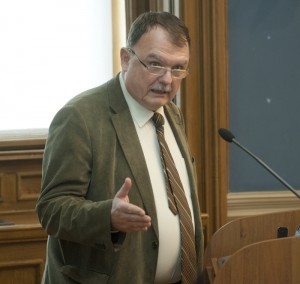The competitiveness of higher education, the sustainability of quality education, the interpretation of university rankings and the change of students’ preferences were the topics of the Hungarian Academy of Sciences (HAS), Section of Economics and Law’s latest assembly and scientific session. The assembly was opened by Dr. Iván Bélyácz, President of the Section of Economics and Law, who emphasised the demand for the development of higher education. Dr. Ervin Balázs, Full Member of the HAS, President of the Hungarian Accreditation Committee, gave a speech on the quality of mass education and the consequences of the introduction of the Bologna-system. Dr. Ádám Török, Secretary General of HAS and professor of the Faculty of Business and Economics in his presentation drew the audience’s attention to the awkwardness and shortcomings of rankings. Dr. Attila Chikán, Full Member of the HAS, idetified the connection between the country rankings and university rankings.
Dr. Barna Mezey, Full Member of the HAS, pointed out importance of publication productivity in terms of university rankings. András Schubert, Specialist of the Library and Information Centre of HAS, underlined the importance of the publishing activity of higher education institutions. Dr. György Fábry emphasised that the presence of rankings is inevitable, because the market called them to life. Dr. András Telcs, Doctor of the Academy, professor of the Faculty of Business and Economics, introduced the methodology, the difficulties and results of ranking Hungarian higher education institution based on the students’ preference list filled out during the application process. Dr. Gyöngyi Csuka, Senior Lecturer of the Faculty of Business and Economics, gave an overview of the results of a recent research investigating students’ preferences.


